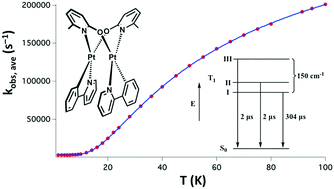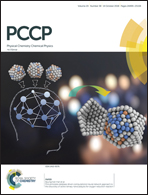Temperature dependence of photophysical properties of a dinuclear C^N-cyclometalated Pt(ii) complex with an intimate Pt–Pt contact. Zero-field splitting and sub-state decay rates of the lowest triplet†
Abstract
The temperature dependence (1.7 K < T < 100 K) of emission decay is reported for the first time for a type of di-nuclear Pt complex featuring a metal–metal-to-ligand charge transfer (MMLCT) lowest energy transition that arises from a strong Pt–Pt interaction. The effect of local variation of the host/guest cage in a polymer matrix upon the phosphorescence decay time constants is characterized by the Kohlrausch–Williams–Watts function. The temperature dependence of the average decay time constants is fit by a Boltzmann-type expression to obtain the average zero-field splittings and individual sublevel decay rates of the photoluminescent triplet excited state.



 Please wait while we load your content...
Please wait while we load your content...